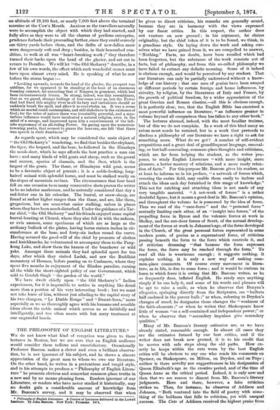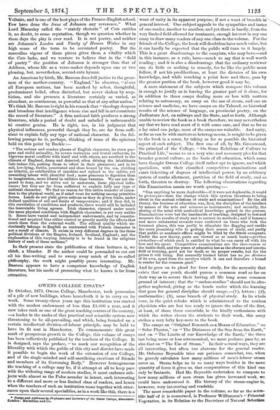THE PHILOSOPHY OF ENGLISH LITERATURE.* WE do not know what
kind of reception was given to these lectures in Boston, but we are sure that an English audience would consider them tedious and unsatisfactory. Occasionally Professor Bascom makes a clever and even a brilliant observa- tion, he is not ignorant of his subject, and he shows a sincere appreciation of the great men to whom we owe our literature. On the other hand, be writes in a pretentious and turgid style, and in his attempts to produce a "Philosophy of English Litera- ture " he presents obvious and somewhat common-place truths in a new and by no means pleasing form. Readers ignorant of our Literature, or readers who have never studied it historically, may no doubt gain a considerable amount of knowledge from Mr. Bascom's survey, and it may be observed that when Philosophy of English Literature. A Course of Lectures delivered in the Lowell Institute. By John Bascom. New York: Putnams. 1874. he gives us direct criticism, his remarks are generally sound, because they are in harmony with the views expressed by our finest critics. In this respect, the author does not venture on new ground ; in his argument, ho claims originality, but the chief token of it is to be found, we think, in a grandiose style. On laying down the work and asking our- selves what we have gained from it, we are compelled to answer, "Nothing." Facts, no doubt, have been recalled which had been forgotten, but the substance of the work consists not of facts, but of philosophy, and from this so-called philosophy we have failed to extract any definite meaning. Some of it indeed is obvious enough, and would be perceived by any student. That our literature can only be partially understood without a know- ledge of our history ; that our men of genius have been swayed at different periods by certain foreign and home influences, .by chivalry, by religion, by the literatures of Italy and France, by the growth of political freedom, by a wider appreciation of the great Grecian and Roman classies,—all this is obvious enough. It is perfectly clear, too, that the English Bible has exercised a most powerful influence on literature, "an influence greater in volume beyond all comparison than has fallen to any other book."
The lectures abound, indeed, with the most familiar truisms, but of this we do not complain. In a work of this kind many an axiom must needs be restated, but in a work that pretends to disclose a philosophy of our literature we have a right toatik for something more. What do we get? A number of self-evident propositions and a great deal of grandiloquent language, conceal- ing, or but half concealing, common-place thoughts and criticisms, which are far from helping the student, as the writer pro- poses, to study English Literature "with more insight, more pleasure, a better mastery of relations, and a more ready reten- tion of facts." For this purpose Mr. Bascom gives his readers, so at least he informs us in his preface, "a network of forces which, covering the entire field, may enable them easily to inclose and attach the ideas each day furnished in this range of knowledge." This net for catching and attaching ideas is not made of any very tangible material. "A net-work of forces" is a rather doubtful figure, but it means a good deal in Mr. Bascom's opinion, and throughout the volume he is possessed by the idea of force. Thus we read of the " race-force " and the "personal force" mutually limiting each other, of an "insight into forces," of the propelling force in Byron and the volcanic forces at work in Shelley, and the out-door forces of Scott, of the normal develop- ment of the forces at work in Johnson's age, of the force developed in the Church, of the great personal forces represented in some modern poets, of genius as a supernatural force, of criticism passing beneath the form to the force which controls it, and of criticism dreaming "that because the form expresses the force, the force may be reached through the form." To read all this is wearisome enough ; it suggests nothing, it explains nothing, it is only a new way of making com- mon-place comments. Of course every movement in litera- ture, as in life, is due to some force ; and it would be curious to learn to which force it is owing that Mr. Bascom writes, as he so frequently does, inflated English. He rarely says anything simply if he can help it, and some of his words and phrases will be apt to raise a smile, as when he observes that Bunyan's allegories, springing directly from the Scriptures, are "bulbets half enclosed in the parent bulb ;" or when, referring to Dryden's changes of creed, he designates those changes the "weakness of the faith-elements ;" or when he writes that Shakespeare knew little of woman "as a self-contained and independent power;" or when he observes that "secondary impulses give secondary qualities."
Many of Mr. Bascom's literary estimates are, as we have already stated, reasonable enough. In almost all cases they are the estimates formed by our best critics, and if the writer does not break new ground, it is to his credit that he moves with safe steps along the old paths. How ex- actly he keeps within the ruts worn by the best English critics will be obvious to any one who reads his comments on Spenser, on Shakespeare, on Milton, on Dryden, and oa Pope ; neither is there novelty nor suggestiveness in his designation of Queen Elizabeth's age as the creative period, and of the time of Queen Anne as the critical period. Indeed, it is only now and then that we see reason to dissent from Mr. Bascom's literary judgments. Here and there, however, a false criticism strikes us. Thus, for instance, he observes of Addison and Johnson, "Both ventured into the field of poetry with some- thing of the boldness that falls to criticism, yet with unequal success. The Cato of Addison received the highest praise from Voltaire, and is one of the best plays of the Franco-English school. Few have done the Pens of Johnson any reverence." What Lord Macaulay called the "stately rhetoric" of Cato entitles it, no doubt, to some reputation, though we question whether in these days the play is ever read. It is not poetry, and neither are Johnson's London and Vanity of Human Wishes in any high sense of the term to be accounted poetry. But the masculine vigour of these pieces gives them a vitality which the Cato lacks, and we venture to believe that in the "field of poetry" the position of Johnson is stronger than that of Addison, whose life as a verse-maker depends upon one or two pleasing, but, nevertheless, second-rate hymns.
An American by birth, Mr. Bascom does full justice to the great- ness of the mother-country. " Englandrhe observes, "above all European nations, has been marked by sober, thoughtful, predomin' ant belief, often disturbed, but never shaken by scep- ticism, and she presents a literature certainly as varied, as abundant, as continuous, as powerful as that of any other nation." We think Mr. Bascom is right in his remark that "theology deepens and broadens that intelligence whose rise and fall in art constitute the record of literature." A firm national faith produces a strong
literature, while a period of doubt and unbelief is unfavourable id creative genius. He is right, too, in his judgment that physical influences, powerful though they be, are far from suffi- cient to explain fully any type of national character. In the fol-
lowing passage he is, perhaps, thinking of some of the opinions held on this point by Buckle :—
" The serious and sombre phases of English character, its stern pur- pose and stolid animality, its severe restraints and brutal outbursts, its -vigorous moral conflicts -with itself and with others, are ascribed to the -climate of England, damp and dejected, often driving the inhabitants into indoor life, putting them to effort in their pleasures ; and to its soil, low-lying, fertile, penetrated and close bound by the sea, yielding no hilarity, no exhilaration of sunshine and upland to the spirits, yet rewarding labour with plentiful food ; more generous to digestion than to imagination, more liberal hi utilities than beauties. We are not dis- posed to deny, and ue strive not to underrate, these physical influ- ences • but they are far from sufficient to explain fully any type of nationial character. We find no reason for this entire transfer of causa- tion to the physical world, as if mind went for nothing among primitive fercea. Lands do not yield given mdiona as they do given fruits, under defined qualities of soil and limits of temperature ; and if they did, in Ibis correlation of conditions and products, there would still be included -the inscrutable living agency. Irish character, ripened under much the same physical conditions with English character, is yet very unlike it. Races have varied and independent endowments, and by constitu- tional and acquired bias either control or greatly modify the effects that reach them from the external world. The ethical quality which un- doubtedly belongs to English as contrasted with French character is not a result of climate. It exists in very different degrees in the three political divisions of the Empire, Ireland, Scotland, England; and the .explanation of this varying intensity is to be found in the religious history of each of these sections."
In their present state the publication of these lectures is, we think, a blunder. If the author could be persuaded to cut out
-all his fine-writing and to sweep away much of his so-called philosophy, the work might possibly prove interesting. Mr. Bascom appears to have a competent knowledge of English
literature, but his mode of presenting what he knows is far from attractive.































 Previous page
Previous page